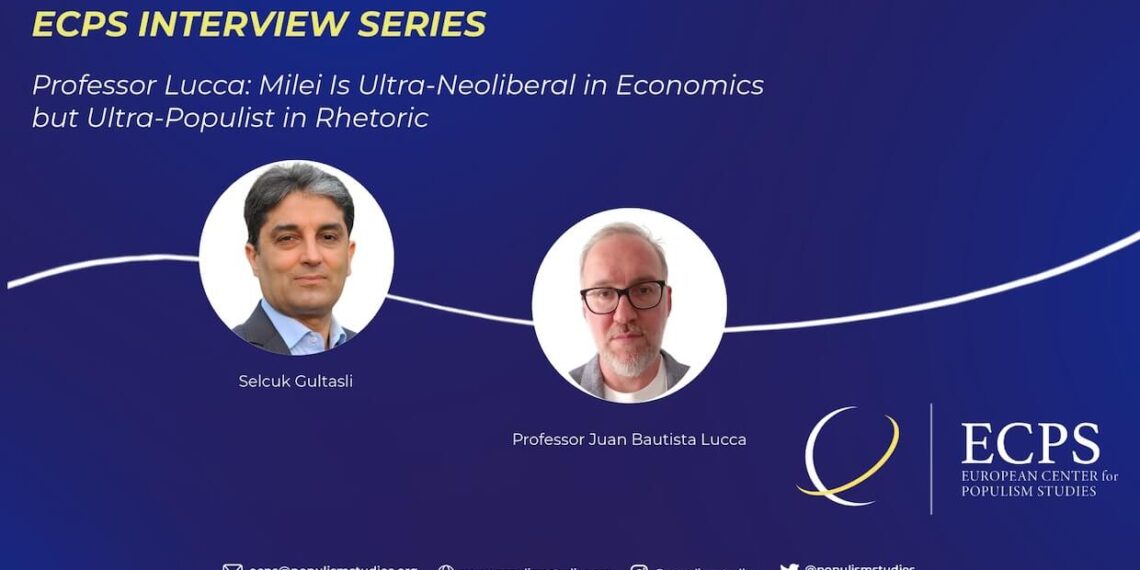In an exclusive interview with ECPS, Professor Juan Bautista Lucca of the National University of Rosario (UNR) analyzes Argentina’s shifting political landscape under President Javier Milei. He argues that Milei’s project represents “a radicalized hybrid—ultra-neoliberal in economics but ultra-populist in rhetoric.” For Professor Lucca, Milei has transformed neoliberalism into a moral crusade, “sacralizing the market” while turning politics into “a permanent apocalyptic theater.” He views Milei’s alliance with Donald Trump as part of a broader “geopolitics of Trumpism in the Global South,” where sovereignty is redefined through ideological, not strategic, ties. Following Milei’s sweeping midterm victory—with La Libertad Avanza winning 41% of the vote—Professor Lucca warns that Argentina stands in a Gramscian “interregnum,” facing both consolidation and disillusionment.
Interview by Selcuk Gultasli
In an in-depth interview with the European Center for Populism Studies (ECPS), Professor Juan Bautista Lucca, a leading political scientist at the National University of Rosario (UNR) and Independent Researcher at CONICET, offers a comprehensive analysis of the Javier Milei phenomenon, situating it within Argentina’s longer populist tradition while revealing its radical departures from the past.
Reflecting on Milei’s sweeping midterm victory, Professor Lucca rejects the idea that the results represent a referendum on economic policy. Rather, he sees them as “an expression of the president’s capacity to maintain a narrative of radical rupture and moral regeneration.” For Professor Lucca, Milei’s strength lies not in delivering material results but in sustaining an affective narrative of moral renewal, one that continues to mobilize polarized sectors of society while leaving centrist voters disengaged. “People in the center,” he observes, “are not very motivated to vote… participation was one of the lowest in the last 40 years of democracy in Argentina.”
Professor Lucca identifies a deeper “normalization of populist discourse” in Argentina’s political mainstream, in which neoliberal orthodoxy is now “celebrated as an act of moral courage.” Unlike past neoliberal leaders such as Carlos Menem or Mauricio Macri, who concealed their economic programs, Milei “doesn’t want to hide this economic agenda; he even sacralizes it.” This, Professor Lucca argues, represents the sophistication of neoliberal populism, where austerity and moral regeneration are fused into a coherent political language.
Asked whether Milei’s libertarian project fits within existing typologies, Professor Lucca insists it marks a qualitative rupture: “He is ultra-neoliberal in economics but ultra-populist in rhetoric.” Milei’s “libertarian populism,” he explains, blends market maximalism and anti-establishment radicalism with “messianic performativity.” His leadership, characterized by a “rock-star persona and apocalyptic imagery,” transforms politics into what Professor Lucca calls “a permanent apocalyptic theater,” where representation depends less on programs than on emotional intensity.
From a geopolitical perspective, Professor Lucca sees Milei’s alliance with Donald Trump and symbolic alignment with Israel as evidence of a “geopolitics of Trumpism in the Global South”—a transnational ideological coordination that redefines sovereignty through shared cultural codes rather than strategic alliances. In this worldview, “external financial dependence is reframed as liberation,” an inversion of Argentina’s traditional narratives of autonomy and self-determination.
Looking ahead, Professor Lucca warns that Argentina stands “in an interregnum—what Gramsci called the time when monsters appear.” Whether Milei’s Leviathan endures or gives rise to “a Behemoth from populist Peronism” remains uncertain. Yet, he notes, the greatest danger lies in a growing “third Argentina”—a disenchanted electorate that “simply doesn’t want to participate in politics.”
Milei’s midterm triumph underscores the urgency of Professor Lucca’s diagnosis. With La Libertad Avanza capturing nearly 41% of the vote, securing 13 of 24 Senate seats and 64 of 127 lower-house seats, Argentina’s president has consolidated his grip on power. The landslide—hailed by supporters as a rejection of Peronism and condemned by critics for deepening inequality—marks a pivotal moment in Argentina’s democratic experiment: one where chainsaw economics meets populist spectacle, reshaping both the country’s political grammar and its social contract.


